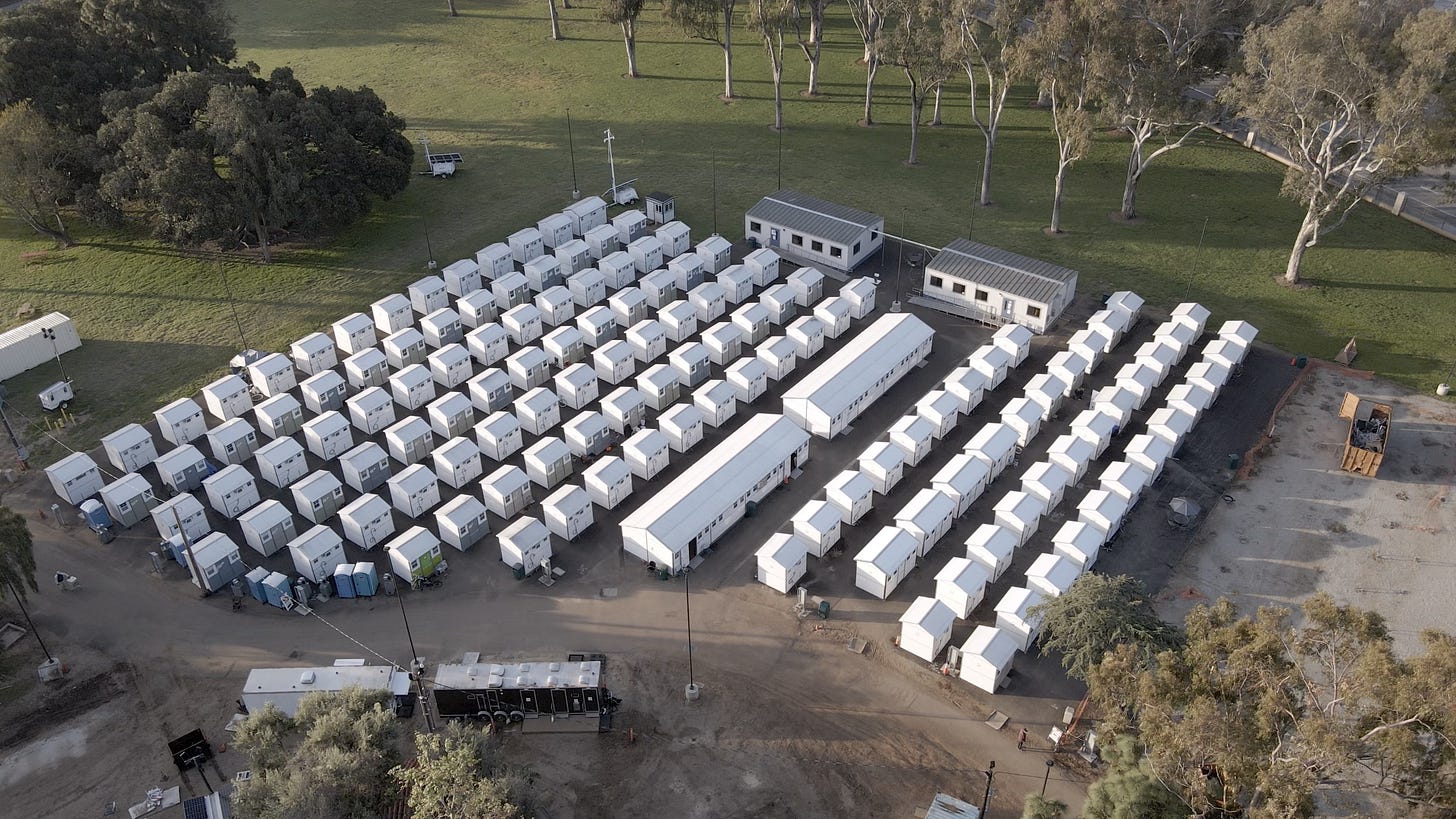Judge orders VA to build 100 temporary housing units on West LA VA campus
“The VA will comply with the court’s orders," said the VA lawyer in response, while also declaring the department was not giving up its appeal rights.

On Friday, Judge David O. Carter ordered the VA to procure and install 100 temporary housing units on the agency’s West Los Angeles campus, the first concrete step toward implementing his ground-breaking judgment restoring the property as a home for disabled veterans.
During a half-day court hearing, VA officials raised a litany of caveats to final approval of the modular housing. Significantly, VA attorney Brad Rosenberg reiterated that the agency disagreed with the substance of Carter’s judgment ordering construction of thousands of temporary and permanent housing units, and was not giving up its appeal rights.
But for the first time, VA officials agreed — at least in principle — to foot the bill for the housing, which could run $90,000 to $160,000 a unit. The department had long insisted its 388 acres of rolling greens on the edge of the exclusive Brentwood neighborhood, originally dedicated as a home for disabled soldiers, had no room for more veteran housing.
“Home of the Brave” needs your support!
Reported for more than three years, “Home of the Brave” has documented disabled vets' decades-long fight for housing at the West LA VA. Our journalism has brought a national spotlight to this struggle, attracting readers like you. The feature is now a finalist in the Anthem Awards, which celebrate efforts that spark meaningful change — and we need your help. Please click the following links and select Long Lead’s “Home of the Brave” for:
• Best Humanitarian Action & Services Awareness (News & Journalism)
• Best Human & Civil Rights Awareness (Special Projects and News & Journalism)
“The VA has heard what the court has said about the need to get veterans off the streets as quickly as possible before the rains,” VA attorney Brad Rosenberg told Carter during the hearing. “The VA will comply with the court’s orders.”
Carter named four campus sites totaling about 4 acres to convert from parking to modular housing, including the lot next to UCLA’s Jackie Robinson Stadium, whose lease was invalidated as not “veteran-centric.” Carter later locked UCLA out of the ballpark.
UCLA late Wednesday filed an emergency appeal with the circuit court to lift the lockout, pending a full-blown appeal by the university. Plaintiffs and Carter, however, in earlier hearings said the university may have forfeited its right to appeal by sitting out the trial and post-trial discussions, despite Carter’s pointed invitations to join in.
On Friday, plaintiff’s expert witnesses Steve Soboroff and Randy Johnson presented drawings of stand-alone modular 400 square-foot units that could be installed with patios and parklets around them.

Rosenberg and a VA facilities acting chief quarreled with the locations and size of the modular housing, and said the costs of utility hookups, janitorial, security and food service, would have to be evaluated before it would approve a housing contract.
Carter sided with the VA on removing stovetops and washer-dryers from the units that Soboroff and Johnson had found for the campus. Carter said he found the risk of fire from cooking appliances compelling, and said a laundry trailer and food canteen could be installed instead of in-unit facilities. He also agreed with the VA that placing temporary housing without sobriety rules near the Domiciliary, where many veterans are in substance abuse recovery, was a bad idea.
But he dismissed VA objections that the units be smaller to increase the number per site.
“It’s not fair to the veterans to bring the size down to 200 square feet,” said Soboroff. “They’re not going to heal in that kind of situation.” This triggered a complaint from VA lawyer Brad Rosenberg that the developer lacked expertise in veteran healing.
Long Lead has been reporting from Powers v. McDonough every day court has been in session, and we will continue to follow this issue in this newsletter. Subscribe here to get updates sent direct to your inbox as soon as they publish:
Rosenberg also objected to Carter citing the VA’s “collaboration” in his order, but the judge overruled him.
“I don’t think collaboration means acquiescence,” Carter told Rosenberg. “I think we’re starting to work together. “ Later he added, “Every veteran we get off the streets in this inclement weather is a blessing.”
Also Friday, Carter held one of two procedural hearings necessary before finalizing a settlement between plaintiffs and the Brentwood School, whose athletic facilities are on VA property. Under the settlement terms, Brentwood will remain on the land, but the veterans will have exclusive use of the school’s pool, track, weight room, and other facilities more than 50 percent of the time. The elite academy will pay the VA $5 million and up its annual rent to $1 million.
The next hearing is scheduled for Friday, Oct. 25.









And the rich keep getting richer.